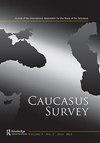乔治亚高原东北部的无政府状态与精神封建主义
IF 0.4
Q3 AREA STUDIES
引用次数: 0
摘要
这似乎是一个悖论,一方面,乔治亚州东北部高地的社区在政治组织方面经常表现为某种程度上的平等主义,而另一方面,他们的宗教世界却高度等级化,并按照封建原则进行排序。对于这一看似矛盾的现象,一个非常可能的解释是封建规范与这些社区的宗法和宗族社会组织的兼容性。本文试图引入另一种解释,即格鲁吉亚东北部高地的宗教制度反映了与低地等级政治制度相关的强制性权力统治的痛苦。我认为,政治体系是作为宗教体系的对立面而构建的,它将强制权力委托给例外的领域,并禁止其在政治生活组织中的使用。在这种并列的情况下,强制性权力被内化了,尽管是作为一个消极的极点。从这个意义上说,不治理的政治旨在消除强制性权力,这种权力是人们通过“宗教”经验所熟知的。后一种观点与反国家社会将强制权力视为外部力量的格言相矛盾。本文章由计算机程序翻译,如有差异,请以英文原文为准。
Ungovernance and Spiritual Feudalism in Northeast Highland Georgia
It seems a paradox that on the one hand, the communities of northeast highland Georgia have often been represented as somewhat egalitarian in respect to their political organisation while on the other hand, their religious worlds are highly hierarchical and ordered by the principles of feudality. One very probable explanation for this seeming paradox points to the compatibility of the feudal norms with the patriarchal and clan-based social organisation of these communities. This article is the attempt to introduce another interpretation, namely that the religious system in northeast highland Georgia reflects the pain of being governed by a coercive power that is associated with the hierarchical political system of the lowland. The political system, I argue, is constructed as a counter-image of the religious system, delegating coercive power to the realm of the exceptional and tabooing its usage in the organisation of political life. In this juxtaposition, coercive power becomes internalised, albeit as a negative pole. The politics of ungovernance, in this sense, aims towards the neutralisation of coercive power, a power that people know all too well through “religious” experiences. The latter argument contradicts the dictum that anti-state societies experience coercive power as exterior.
求助全文
通过发布文献求助,成功后即可免费获取论文全文。
去求助
来源期刊

Caucasus Survey
Arts and Humanities-History
CiteScore
1.30
自引率
9.10%
发文量
4
期刊介绍:
Caucasus Survey is a new peer-reviewed, multidisciplinary and independent journal, concerned with the study of the Caucasus – the independent republics of Armenia, Azerbaijan and Georgia, de facto entities in the area and the North Caucasian republics and regions of the Russian Federation. Also covered are issues relating to the Republic of Kalmykia, Crimea, the Cossacks, Nogays, and Caucasian diasporas. Caucasus Survey aims to advance an area studies tradition in the humanities and social sciences about and from the Caucasus, connecting this tradition with core disciplinary concerns in the fields of history, political science, sociology, anthropology, cultural and religious studies, economics, political geography and demography, security, war and peace studies, and social psychology. Research enhancing understanding of the region’s conflicts and relations between the Russian Federation and the Caucasus, internationally and domestically with regard to the North Caucasus, features high in our concerns.
 求助内容:
求助内容: 应助结果提醒方式:
应助结果提醒方式:


